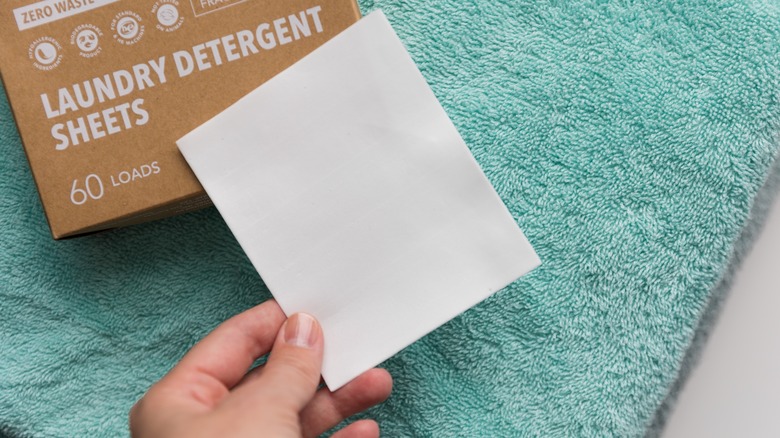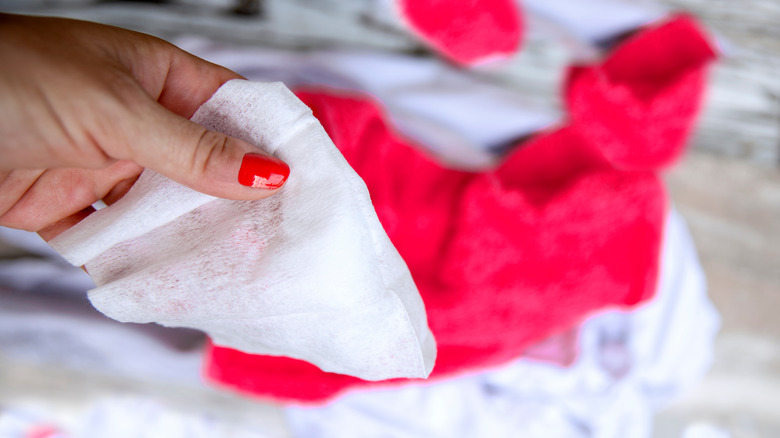Why You Should Be Switching To Liquidless Detergent Sheets
While you may have finally figured out how many dryer sheets you should use in each load, did you know that detergent sheets now exist? That's right — liquidless detergent sheets — a distant cousin of the dryer sheet that looks-wise could pass as a sibling. This innovative cleaning product is revolutionizing the laundry world with its convenience, no-fuss design, and performance power. However, the real reason you should be switching to liquidless detergent sheets is to help save the planet.
Also known as detergent squares or detergent strips, liquidless detergent sheets are simply pieces of lightweight, perforated, dissolvable paper treated with pre-measured concentrated laundry detergent. Just add half a sheet to small and medium loads, a full sheet to large loads, and two to heavily soiled loads. The sheets work in cold and hot water, are low sudsing, and break down completely during the wash cycle, which means no more dealing with annoying residue, clumps, or globs of traditional laundry detergent clinging to your clothes or coating the inside of your washing machine. Overall, less mess and less waste while simultaneously protecting the environment.
Benefits of using liquidless detergent sheets
Let's face it, most homeowners are so busy dealing with everyday life that calculating the effect that liquid detergent has on Mother Earth often gets overlooked. However, you don't have to be an eco-warrior to appreciate the benefits of switching from conventional detergents to liquidless sheets. The minimalist packaging alone will bring joy if you are tight on space and tired of heaving dumbbell-sized detergent bottles off shelves. Most detergent sheets come packaged in compact, biodegradable cardboard containers that are exponentially more eco-friendly than large plastic detergent jugs criticized for polluting waterways and packing landfills. You can even use the empty detergent sheet packages to make your own DIY compost.
Manufacturers of liquidless detergent sheets pride themselves in catering to consumers who embrace all-natural products whether the reason is motivated by conscience or a medical condition. Nearly all liquidless laundry sheets are hypoallergenic, meaning they are free of bleaches, dyes, parabens, phosphates, and other harsh chemicals. Some even commit to being vegan and cruelty-free. If you suffer from sensitive skin or are washing diapers or clothing for newborns and infants, look for unscented liquidless detergent sheets that are certified as dermatologist-tested. Most brands also tout being palm oil free. The ingredient, widely chided for being linked to dangerously high levels of carbon emission, is replaced by natural plant molecules in liquidless detergent sheets.
What to know before you switch to detergent sheets
Before you go all in on liquidless detergent sheets, consider their effectiveness. The Internet is teeming with reviews of paper detergents, offering mixed results. Consumer Reports tested a variety of brands and found that most struggled to erase protein stains, especially coffee-based spots. Conversely, testers at USA Today had few complaints when it came to stain removal. According to reviewers, liquidless detergent sheets were able to lift food and dirt from clothes in a single wash without being pre-treated. However, they did note that fragrance was an issue, stating that most scented varieties of liquidless detergent sheets were disappointing when it came to providing an advertised smell of freshness.
In the end, if you are looking for an easy way to contribute to a greener society, or you simply want to try a safer product to wash your family's dirty laundry, think about switching to liquidless detergent sheets. If you are still not convinced, consider that in addition to being able to sufficiently clean routine loads, the detergent sheets are hard to beat if you are traveling. The liquidless sheets are TSA-approved and take up minimal space in luggage. Moreover, the condensed packing also cuts down on shipping, which reduces your carbon footprint.


